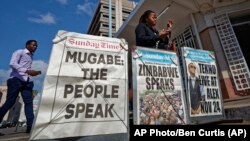An exhibition of photos, videos, paintings and posters among other images captured during protests against Zimbabwe's former long-serving president, Robert Mugabe last year, recently opened at the National Gallery of Zimbabwe.
The work documented by artists and ordinary Zimbabweans as President Robert Mugabe was being forced out of office by the military aims to explore various topics from jubilation to uncertainty, resilience and hope, at a time when Mugabe was in the tightest spot of his 37-year rule.
The show titled "Lost and found" gives insight into the period, when civilians were on the edge, unsure of what would become of the country's security situation.
Tanks were on the streets and troops had occupied the state broadcaster, from where the army later announced it had taken control of Zimbabwe.
People came out in large numbers to show support for the army and Mugabe's tenure finally came to an end on November 21 following the de facto military coup.
Raphael Chikukwa is the curator at the National Gallery of Zimbabwe.
"As people in Africa our stories have been told by many other people so the motivation was for us to be able to tell our own story through the images that you are seeing in this exhibition which are coming from both professional and non-professional photographers and artists coming from all over Zimbabwe to be able to tell their story, the events and the moments that transpired into a new dispensation in Zimbabwe on the 18th of November 2017," he said.
Chikukwa says things are already changing in the country.
In the past, artists and galleries knew they had to tone down any ideas seen to be critical of government or undermining the president, which led to increased self-censorship.
The exhibition also aims to provide a platform for artists to reflect and interrogate the country's politics in light of recent events.
Photojournalist, Charmaine Chitate, displayed her work at the show.
"The messages here are more of the resilience of the people, what people wanted ,for the longest time we have been passive nationals but we had an opportunity to show our resilience and we went and marched and documented the march showing what people stood for and what their need was," she said.
"On the day you don't see the different angles, we didn't see the different angles and now to experience it and to see it through other people's eyes it just really brings back good emotions," said Rutendo Makon, a guest at the event.
"It has brought back those memories and those feelings of that day when we felt liberated, we felt free. We felt like it was a new beginning for our country," said Chido Nyakudya, another guest at the exhibition.
Guests also got to see videos filmed by Matthew Boka who runs a drone business in the country that mostly provides surveillance for crops growing in farms.
"On the 18th of November we decided that the atmosphere was too good and the opportunity was actually being lost because the people were actually worried about police teargassing and disrupting the march. So on Friday night we decided to pack up the drone, charge everything and on Saturday we went and we actually beamed most of the footage live on Facebook," he said.
About 20 exhibitors are participating in the event. The show runs until April. (Reuters)




